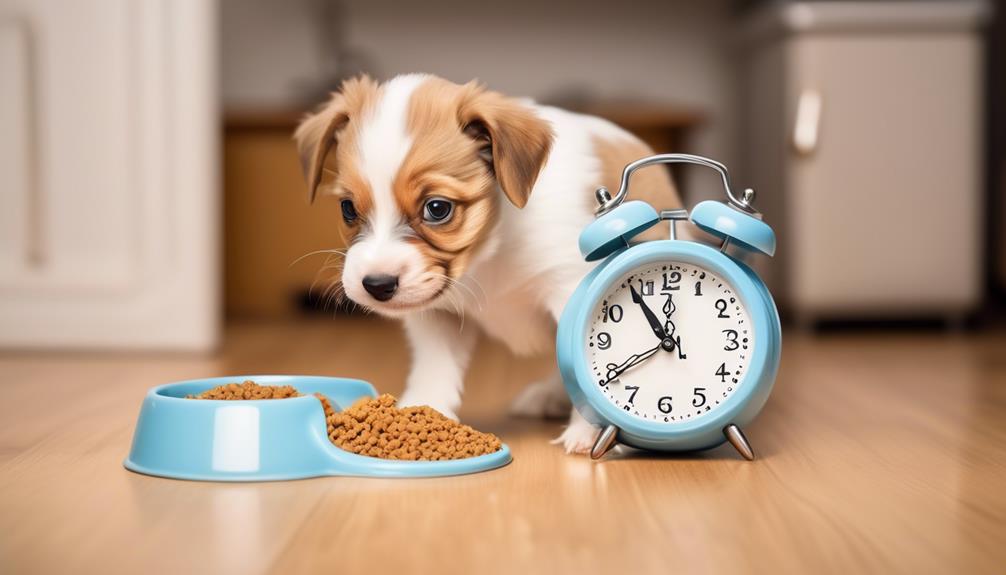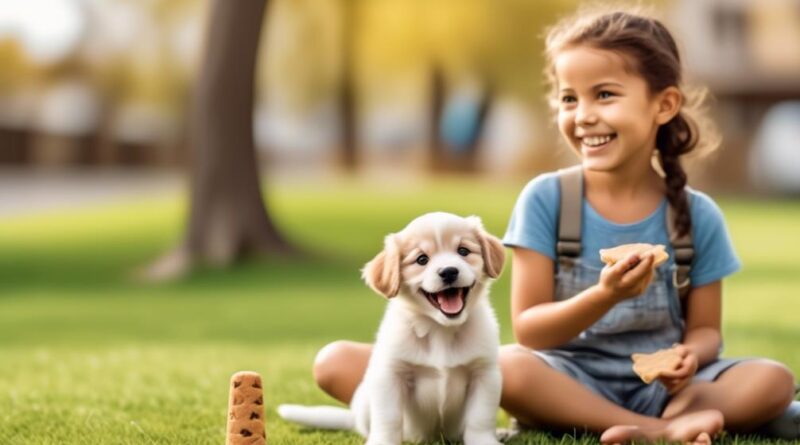3 Best Housebreaking Tips for Small Breed Puppies
Housebreaking a small breed puppy can be both rewarding and challenging. While their size may make accidents seem less daunting, the truth is, small breed puppies often require more diligent training and attention to establish good habits.
You may be surprised to learn that the key to successful housebreaking lies in consistency and patience, but it's not as complicated as it may seem. By implementing a few simple yet effective strategies, you can set your small breed puppy up for success in their housebreaking journey.
Establish a Routine
To establish a routine for housebreaking your small breed puppy, begin by setting consistent times for feeding, potty breaks, and playtime.
Crate training is an essential tool for housebreaking your puppy. It provides a safe and secure space for your puppy when you're unable to supervise them. Make sure the crate is just big enough for your puppy to stand up, turn around, and lie down comfortably. Introduce your puppy to the crate gradually, using positive reinforcement such as treats and praise. This helps them associate the crate with positive experiences.
Additionally, potty training pads can be a useful aid in housebreaking your small breed puppy. Place the pads in a designated area of your home to encourage your puppy to relieve themselves in that spot. When your puppy uses the pad, be sure to offer plenty of praise and rewards. Gradually move the pad closer to the door and eventually outside to encourage outdoor potty habits. Consistency is key when using potty training pads, as it helps your puppy understand where they should go to the bathroom.
Use Positive Reinforcement
Using positive reinforcement, you can effectively encourage your small breed puppy to exhibit desired behaviors during the housebreaking process. One effective method is clicker training, which involves using a small device that makes a clicking sound to mark the exact moment your puppy does something right. Pairing this sound with a reward, such as a small treat, helps your puppy associate the action with a positive outcome. Clicker training can be particularly useful for small breed puppies as it provides clear and immediate feedback.
Crate training is another positive reinforcement technique that can aid in housebreaking your small breed puppy. By using a crate that's just big enough for your puppy to stand up, turn around, and lie down in, you can create a safe and comfortable space for them. Dogs are naturally den animals, so a crate can become their den, where they're less likely to have accidents.
When your puppy goes to the bathroom in the designated area outside the crate, you can reward them with praise and a treat. This positive reinforcement helps your puppy understand that eliminating outside is the desired behavior.
Supervise Closely
When implementing positive reinforcement techniques like crate training, closely supervising your small breed puppy is crucial during the housebreaking process. Potty training a small breed puppy requires diligent supervision to prevent accidents and reinforce good behavior. By keeping a close eye on your puppy, you can anticipate when they need to go outside and guide them to the designated potty area.
Crate training also plays a vital role in the supervision process. When you can't directly supervise your puppy, confining them in a crate can prevent accidents and help them learn to control their bladder and bowel movements.
During potty training, it's essential to supervise your puppy at all times, especially after meals, playtime, and naps. These are common times when puppies need to relieve themselves. By closely monitoring them during these periods, you can prevent accidents inside the house and quickly guide them to the appropriate potty spot outside.
When using crate training, ensure that your puppy has regular, supervised breaks outside the crate for potty time and playtime.
Choose a Designated Potty Area
Consider selecting a designated outdoor potty area for your small breed puppy that's easily accessible and consistent. When it comes to potty training techniques, having a designated potty area can help your puppy understand where they're supposed to go. Choose an area close to your home, ideally with easy access from the door your puppy will use most frequently. Consistency is key, so ensure the chosen spot is always available and free from obstructions.
If outdoor potty training isn't feasible due to your living situation, indoor potty options can be considered. There are various indoor potty solutions available, such as pee pads, artificial grass patches, or even specialized indoor potty systems. When using indoor potty options, it's crucial to place them in a consistent location within your home. This will help your small breed puppy understand where they should go when nature calls.
Whichever option you choose, the designated potty area should be a place where your puppy feels comfortable and safe. Avoid high-traffic areas, loud or intimidating spots, and areas with extreme temperatures. It's important to make the potty area an inviting and positive space for your puppy.
Be Patient and Consistent
To effectively housebreak your small breed puppy, patience and consistency are essential for successful training. Small breed puppies, like all young animals, need time to understand and adapt to new routines. Consistency in your training methods will help your puppy learn what's expected of them. Here are some tips to help you be patient and consistent in your housebreaking efforts:
- Crate Training: Utilize a crate as a tool to aid in housebreaking. When your puppy isn't being directly supervised, keep them in the crate to prevent accidents in the house. Use the crate as a positive space, never as a form of punishment. Be patient as your puppy adjusts to the crate and be consistent in using it as part of their routine.
- Leash Training: Consistently take your puppy outside on a leash to the designated potty area. Be patient as they learn to walk on a leash and associate it with going potty. Use consistent verbal cues or commands to reinforce the association between going outside and using the bathroom.
- Positive Reinforcement: Consistently reward your puppy for going potty in the designated area. Use patience to wait for them to finish and then immediately praise and reward them. Consistency in this positive reinforcement will help your puppy understand what behavior is expected of them.
Clean Accidents Promptly
Promptly clean any accidents your small breed puppy has in the house to prevent them from establishing the area as a designated potty spot. Accident prevention is crucial in the housebreaking process. When accidents occur, it's important to act swiftly to remove any traces of odor and stains to discourage your puppy from repeating the behavior in the same spot.
To prevent accidents from becoming a habit, start by using odor removal techniques. Blot up as much of the mess as possible with paper towels, then apply a pet-specific enzymatic cleaner to the affected area. These cleaners are designed to break down the odor-causing compounds in pet urine, effectively eliminating the scent that can attract your puppy back to the same spot. Follow the instructions on the cleaner's label for the best results.
In addition to using enzymatic cleaners, consider using a black light to identify hidden urine spots. Even if you've cleaned up visible accidents, puppies may still be drawn to the scent of urine that has seeped into carpets or flooring. A black light can help you locate these areas so you can thoroughly clean and treat them.
Consistency is key when cleaning up accidents. By promptly and effectively removing any traces of accidents, you'll help prevent your small breed puppy from associating certain areas of your home with bathroom behavior, making the housebreaking process smoother for both you and your pet.
Adjust Feeding Schedule

You should gradually adjust your small breed puppy's feeding schedule to help regulate their bathroom habits during the housebreaking process. Small breed puppies have fast metabolisms, so feeding them at consistent times can help regulate their bowel movements and make it easier for you to predict when they need to go outside.
Here are a few tips to help you adjust your puppy's feeding schedule:
- Crate Training: Incorporate feeding into your puppy's crate training routine. This means feeding your puppy at specific times and then taking them outside shortly after to help them associate the crate with mealtime and potty time.
- Monitor Water Intake: Pay attention to your puppy's water intake, and try to regulate it. Avoid giving them water too close to bedtime to help reduce the likelihood of overnight accidents.
- Potty Training Pads: If you're using potty training pads, coordinate the feeding schedule with their use. For example, feed your puppy, wait 10-15 minutes, and then take them to the potty training pad. This can help them associate the pad with going potty after meals.
Seek Professional Help if Needed
If your small breed puppy's housebreaking progress isn't improving despite your best efforts, seeking professional help is a wise decision to address any underlying issues.
Professional training can be invaluable in addressing stubborn behavioral issues that may be hindering your puppy's housebreaking success. Sometimes, despite consistent efforts and patience, certain puppies may exhibit resistance or difficulty in grasping housebreaking concepts. This is where professional guidance can make a significant difference.
Professional trainers have a deep understanding of various training methods tailored to address specific behavioral issues common in small breed puppies. They can assess your puppy's individual needs and create a customized training plan to expedite the housebreaking process. Moreover, their expertise allows them to identify any underlying health issues that could be contributing to your puppy's housebreaking challenges.
Frequently Asked Questions
How Can I Prevent My Small Breed Puppy From Feeling Anxious or Stressed During the Housebreaking Process?
To prevent your small breed puppy from feeling anxious or stressed during housebreaking, try calming techniques like soothing music or massage. Identify anxiety triggers and avoid them. Use positive reinforcement and establish a routine for consistency.
Are There Any Specific Tips for Housebreaking Small Breed Puppies Who Live in Apartments or Condos?
When housebreaking challenges arise for small breed puppies in apartments or condos, consider indoor potty options like pee pads or artificial grass. Consistency, positive reinforcement, and frequent outdoor breaks can help your puppy adjust to the new environment.
What Should I Do if My Small Breed Puppy Is Having Accidents in the House Despite Following All the Housebreaking Tips?
If your small breed puppy is having accidents in the house despite following housebreaking tips, it may be experiencing potty training regression. Try implementing behavioral modification techniques such as positive reinforcement and consistent scheduling.
Is It Okay to Use Puppy Pads or Artificial Grass for Housebreaking Small Breed Puppies, or Should I Stick to Outdoor Potty Training Only?
It's totally fine to use puppy pad alternatives or indoor potty options for housebreaking small breed puppies. Training techniques vary, and indoor options can be helpful for housebreaking challenges, especially during bad weather.
Are There Any Special Considerations or Tips for Housebreaking Small Breed Puppies Who Are Also Being Crate Trained?
When crate training small breed puppies, it's important to consider their anxiety levels. Introduce them to the crate gradually and make it a positive space. Use indoor potty options to prevent accidents and reinforce good behavior.
Conclusion
So there you have it! By establishing a routine, using positive reinforcement, and closely supervising your small breed puppy, you can successfully housebreak them.
Remember to be patient and consistent, choose a designated potty area, and clean accidents promptly.
Adjusting their feeding schedule and seeking professional help if needed can also make a big difference.
With these tips, you'll have your small breed puppy housebroken in no time!
